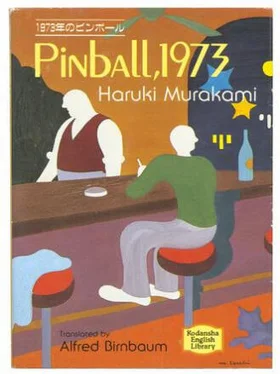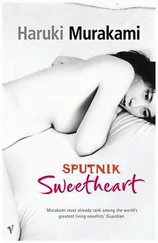Haruki Murakami - Pinball, 1973
Здесь есть возможность читать онлайн «Haruki Murakami - Pinball, 1973» весь текст электронной книги совершенно бесплатно (целиком полную версию без сокращений). В некоторых случаях можно слушать аудио, скачать через торрент в формате fb2 и присутствует краткое содержание. Издательство: Unknown publisher, Жанр: Современная проза, на английском языке. Описание произведения, (предисловие) а так же отзывы посетителей доступны на портале библиотеки ЛибКат.
- Название:Pinball, 1973
- Автор:
- Издательство:Unknown publisher
- Жанр:
- Год:неизвестен
- ISBN:нет данных
- Рейтинг книги:3 / 5. Голосов: 1
-
Избранное:Добавить в избранное
- Отзывы:
-
Ваша оценка:
- 60
- 1
- 2
- 3
- 4
- 5
Pinball, 1973: краткое содержание, описание и аннотация
Предлагаем к чтению аннотацию, описание, краткое содержание или предисловие (зависит от того, что написал сам автор книги «Pinball, 1973»). Если вы не нашли необходимую информацию о книге — напишите в комментариях, мы постараемся отыскать её.
Pinball, 1973 — читать онлайн бесплатно полную книгу (весь текст) целиком
Ниже представлен текст книги, разбитый по страницам. Система сохранения места последней прочитанной страницы, позволяет с удобством читать онлайн бесплатно книгу «Pinball, 1973», без необходимости каждый раз заново искать на чём Вы остановились. Поставьте закладку, и сможете в любой момент перейти на страницу, на которой закончили чтение.
Интервал:
Закладка:
"How many machines were imported into Japan?"
"I looked into it. Exactly three."
"That's all?"
He nodded. "That's because there wasn't any route to Japan for Gilbert products. In sixty-nine, one import agency brought some in as an experiment. Those three machines. And by the time they got around to a supplementary order, Gilbert & Sands no longer existed."
"Those three machines, do you know their whereabouts?"
He gave the sugar in his coffee cup a few stirs, then scratched fervently at his earlobe.
"One machine went to a small game center in Shinjuku. The game center folded the winter before last. The whereabouts of the machine, unknown."
"That much I know."
"Another machine went to a game center in Shibuya. That burned down last spring Granted, they had fire insurance and nobody took a loss. Only another 'Spaceship' vanished from the face of the earth. No two ways about it, it's an ill-fated machine."
"It's starting to sound like the Maltese Falcon," I said.
He nodded. "And as to the whereabouts of the third machine, I have no idea."
I gave the address and telephone number of J's Bar. "But it's no longer there. Got rid of it last summer.
He meticulously made a memo in his notebook.
"The machine I'm interested in was the one in Shinjuku," I said. "You really have no idea where it went?"
"There are several possibilities. The most obvious being scrap. The turnover of machines is quite fast. Your ordinary machine depreciates in three years to where a new machine is more economical than repairs. Of course, there's the question of what's in style. That's why some things get scrapped. A second possibility is that it gets traded in as used equipment. Old models that are still usable get passed around from hand to hand, and wind up in some dive, where they end their days at the mercy of drunks and amateurs. Then third, in extremely rare cases, an enthusiast might get hold of it. But eighty percent of the time, it's the scrapheap."
I scissored an unlit cigarette between my fingers, and thought myself into a dark mood
"About that last possibility, any way to check up on something like that?"
"Couldn't fault you for trying, but it'd be difficult. Hardly any contact between enthusiasts. No registers, no official society organs but hell, we'll see what we can do. I myself have some interest in the 'Spaceship'."
"Much obliged."
He sank back deep in his chair, and puffed on his cigarette.
"Just out of curiosity, what was your best score on the 'Spaceship'?"
"A hundred and sixty-five thousand," I said.
"Now that's impressive," he said with not the least change of expression. "Really quite impressive." Then he scratched his ear again.
18
The following week or so my mood was strangely languid and serene. Pinball still echoed in my ears a bit, but that fitful buzzing like the beating wings of a bee marooned in a patch of winter sunlight had all but vanished. Autumn took on greater depth with each passing day, and the woods around the golf course dropped their load of dry leaves on the ground. From the apartment window you could see piles of burning leaves here and there on the rolling suburban hills, smoke snaking up into the sky like magic ropes.
Little by little, the twins grew silent, then subtly sad. We'd take our walks, drink coffee, listen to records, cling to one another under the blankets, and sleep. On Sunday we walked an hour to the arboretum, and ate mushroom-and-spinach sandwiches amidst the oaks. While in the treetops, black-tailed wild birds sang clear and pure.
Little by little, the air was growing chilly, so I bought two new sports shirts for them, and gave them some old sweaters of mine. Hence they ceased to be 208 and 209, and became Olive Green Crewneck Sweater and Beige Cardigan, though neither complained. Besides that, I bought them socks and new sneakers. I felt like a regular sugar daddy.
The October rains were a thing to behold. Needle-fine and soft as cotton, coming down uniformly over the golf course turf that was just beginning to wither. No puddles formed, the rainwater sank slowly into the earth. After the rains, the woods were heavy with the smell of damp fallen leaves, and a few slanting rays of the setting sun would trace a dappled pattern on the ground. Birds raced across the paths through the woods.
Days at the office passed more or less the same.
I'd listen to cassette tapes of old jazz — Bix Beiderbecke, Woody Herman, Bunny Berrigan – while crossing the pass over mountains of work, smoking cigarettes to keep up a leisurely pace, having a shot of whiskey every other hour, eating cookies.
Only the office girl kept up a harried pace, checking schedules, making airplane and hotel reservations, darning two more of my sweaters, and putting new metal buttons on my blazer for good measure. She changed her hairstyle, changed her lipstick to a pale pink, wore thin sweaters that showed off her bustline. It all blended into the autumn weather.
It was a great week, one to be remembered for all eternity.
19
It was hard breaking the news to J that he was leaving town. The Rat didn't know why it was so hard.
Three days in a row he went to the bar, and not once in those three days could he bring himself to broach the subject. Each time he'd get up the nerve to tell him, his throat would get all dry, and he'd drown it in beer. Weak-willed, he kept on drinking.
You keep on floundering, thought the Rat, and never get anywhere.
When the clock struck twelve, the Rat could only stand up, somewhat relieved, say his good-night to J the same as always, and leave. The night breeze had gotten positively cold. He returned to his apartment, sat down on the bed, and idly watched television. He opened a can of beer and smoked a cigarette. An old western with Robert Taylor, then a commercial, weather report, commercial, static.
The Rat turned off the television, got in the shower. Then he opened another can of beer and smoked another cigarette.
He had no idea where to go once he left this town. He felt like he had no place to go.
For the first time in his life, fears crept up from deep inside him. Fears like dark, shiny crawly things from underground. Without eyes, without the least endearing quality. The Rat was dragging himself underground just like them. He felt their slime all over his body. He opened a can of beer.
Over those three days the Rat's apartment had become littered with empty beer cans and cigarette butts. He wanted to see the woman real bad. Wanted to feel the warmth of her skin all over, to be inside her forever. But you'll never go back to her place. Done burnt that bridge, thought the Rat, haven't you now, over that door, sealed yourself off.
The Rat gazed out at the beacon. The sky was getting light, the sea was beginning to turn gray. And by the time the crisp morning light had swept away the darkness like you'd brush off a tablecloth, the Rat had climbed into bed and fallen asleep with pains that had no place to go.
* * *
The Rat's decision to leave town seemed to have firmed up, at least for the time being. It was a conclusion reached after long hours of looking at things from every angle. It seemed impenetrable.
He struck a match, and ignited the bridge. There went the last of anything left kicking around in his heart, though maybe something of himself would be left in town. Not that anyone would notice. And as the town changed, even that trace would vanish.
Everything would go on regardless.
Now to tell J.
The Rat couldn't figure out why the guy's presence should disturb him as much as it did. A quick, Hey, I'm leaving town, take care, and that would do it. It's not like they knew a thing about each other, after all. Total strangers, just happened to be passing by, that was all. Even so, the Rat's heart ached. Lying face up on the bed, he shook a tightly clenched fist in the air.
Читать дальшеИнтервал:
Закладка:
Похожие книги на «Pinball, 1973»
Представляем Вашему вниманию похожие книги на «Pinball, 1973» списком для выбора. Мы отобрали схожую по названию и смыслу литературу в надежде предоставить читателям больше вариантов отыскать новые, интересные, ещё непрочитанные произведения.
Обсуждение, отзывы о книге «Pinball, 1973» и просто собственные мнения читателей. Оставьте ваши комментарии, напишите, что Вы думаете о произведении, его смысле или главных героях. Укажите что конкретно понравилось, а что нет, и почему Вы так считаете.












